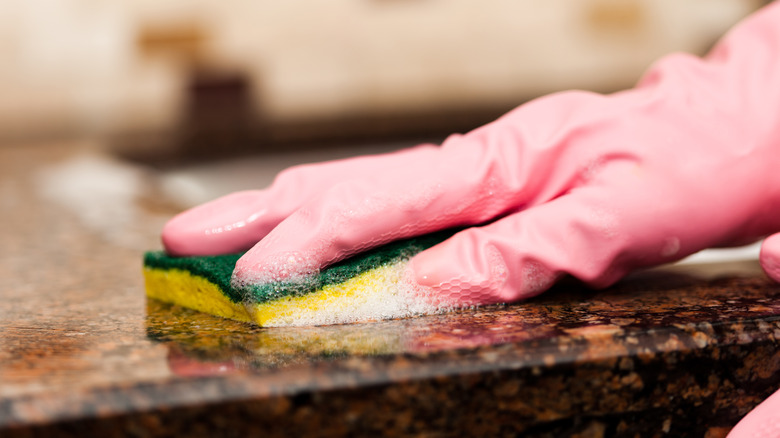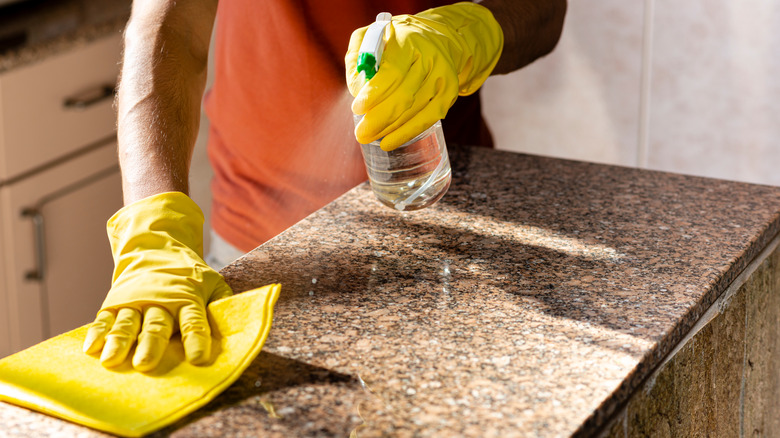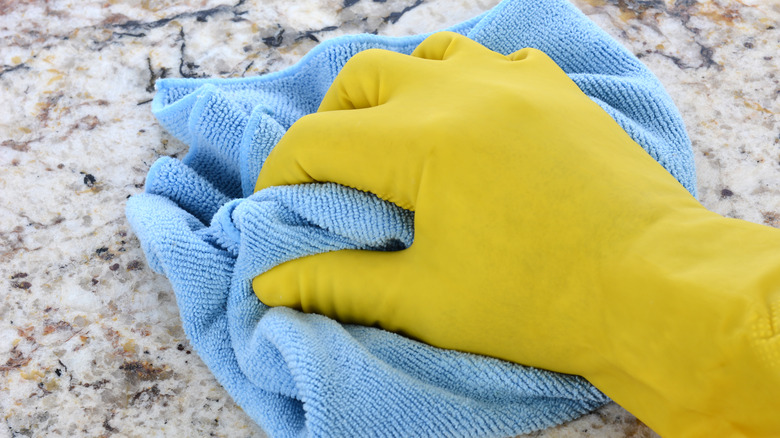Use This Bathroom Staple To Clean Stubborn Rust Stains Off A Granite Countertop
Many homeowners opt for stylish granite countertops because of their visual appeal and durability. The material is sold in a wide variety of colors and patterns, so it is not difficult to find something that complements your space. Granite is also one of the strongest countertop materials and is very long-lasting, making it a perfect fit for those who do not want to deal with frequent countertop replacements. However, granite is also prone to rust stains. Thankfully, surface-level rust stains can easily be removed from granite with hydrogen peroxide.
The natural minerals that make up granite often oxidize. This can result in rust stains that worsen over time. Granite is also extremely porous, meaning staining can easily travel deep into the material if it is not addressed right away. Rust on granite countertops often comes from standing water or a metal object that has been set on top of the material for too long. Rust stains can occur as a result of spills, leaky faucets, pots or pans stored on countertops, and more. If you do not resolve the problem right away, you might be left with stubborn rust stains that seem impossible to remove. Hydrogen peroxide can help your countertops look as good as new again.
How to remove rust stains from your granite countertops with hydrogen peroxide
To remove those pesky rust stains from your granite countertops, you will need to pour either a 3% or 4% hydrogen peroxide solution over the affected areas. You can also fill a spray bottle with hydrogen peroxide for easier application, and spray it onto the stains instead. After wetting the rusty spots with the solution, scrub the stains with a gentle scrubbing tool that is safe to use on granite. Allow the solution to sit for a day. After 24 hours, use water and a damp cloth to wipe away the remaining hydrogen peroxide. Dry the area thoroughly.
Keep in mind that this will only remove rust stains that have only soaked into the top layer of a granite countertop. If your countertop has a protective sealant, there is a chance that the stain has only soaked into the top layer. However, those without a sealant on their countertops might be dealing with deeper rust stains that will need to be removed by a professional. It is also important to remember that you should not use a hydrogen peroxide solution stronger than 4% because a higher concentration may damage granite. Finally, you might be tempted to try out other household chemicals that you may already have on hand to remove rust, but it is best to stick with hydrogen peroxide. Do not use vinegar to clean granite, as it will harm the material.
Tips for preventing rust stains
Once rust stains have soaked deep into your granite countertops, this hydrogen peroxide cleaning method will likely no longer be effective. At this point, you will need to pay a professional to come to your home and solve the problem, which can get pricey. You may want to consider taking steps to prevent future rust stains to avoid this.
First, be mindful of any water or other liquids that come into contact with your counters. Avoid storing cooking oil on granite countertops because it is particularly tricky to remove. Wipe all spills up right away so that they don't sit long enough to cause rust. Pay special attention to the area around your kitchen sink and any other spots that frequently come into contact with water.
Do not set metal cooking utensils or cookware on your granite countertops for long periods, especially when they are wet. Consider investing in pot or utensil holders so that these metal objects do not come into direct contact with your countertops. Finally, ensure your counters are sealed so that stains cannot penetrate deeper than surface level.


